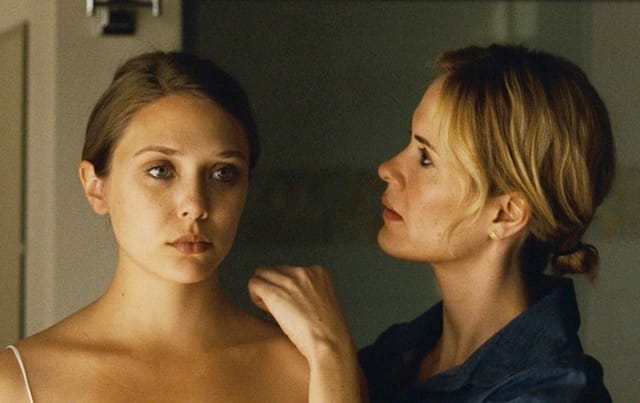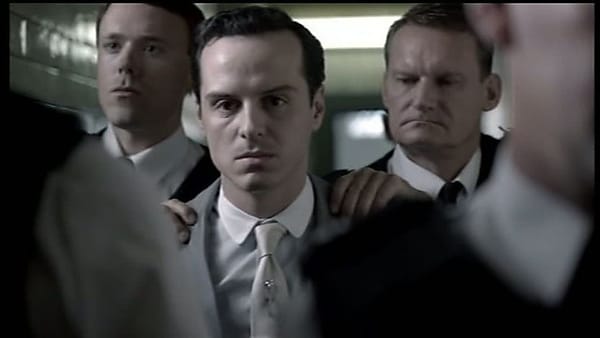Mysterious, magnetic, monstrous, maddening
John Park scrutinizes a film with one to many Ms

Martha Marcy May Marlene
Director Sean Durkin Screenwriter Sean Durkin Cast Elizabeth Olsen, John Hawkes, Sarah Paulson, Hugh Dancy
With a title that is as confusing as this one, it would be a safe bet to assume that Martha Marcy May Marlene is a film that attempts to mess with your head. We see a young girl (Elizabeth Olsen) fleeing from a housing compound in the harmless-looking countryside. A boy running after her calls her Marcy May. Not much confusion there. Things get more complicated when Marcy May’s older sister Lucy (Sarah Paulson) calls her Martha. Another flashback sees the female protagonist being called Marlene. The audience is further confused and intrigued for sure. Thus starts the haunting story of Martha (this appears to be her real name), a young, innocent girl who makes the mistake of running away from her home and joining a violent cult.
The circumstances behind why she ran away from home in the first place are never clear, and it’s never important enough for us to care. It’s what follows after her eventual escape that grips us from start to finish. Having been trapped in her strict, psychosexual cult for around two years, the normal outside world is a difficult one to fit back into. It’s the little things that add up to Martha being portrayed as a complete lunatic. When she goes for a swim, she does so completely naked, something that is not tolerated in the normal world. When her sister is having sex with her husband Ted (Hugh Dancy), she thinks it is socially acceptable to climb into bed with them. Ted, who was initially more than happy to see the return of his sister-in-law, is no longer pleased to have her around, and wants her out of his house.
Beautifully edited between the past and present, we are shown the kind of life Martha was living before she found the courage to run away. It seems harmless at first, as the leader of the camp, the charismatic Patrick (John Hawkes) seems like a perfectly ordinary guy. But as he asks his crew to shoot live kittens point-blank, exploits members to take part in many group sexual acts, and readily gives permission for murder, alarm bells start ringing for Martha, which prompts her to turn her back on the strange cult. But it’s the paranoia that keeps the poor heroine from having a normal life: afraid that she has not fully escaped, and with dreams and constant reminders that create an unbearable environment for Martha to live in, no matter where she goes or who she turns to.
Olsen, the less famous younger sister of the Olsen twins, puts on an astonishing debut performance as the damaged young girl, always so weak and vulnerable, petrified at the prospect of what might happen to her if she is not careful. She is distant and withdrawn, and clearly shows the obvious effects of a traumatised individual with natural restraint. There isn’t a hint of awkward or forced emotion here with Olsen, and this is no doubt the breakout performance of the year. The developing dynamic between Martha and her older sister is an interesting one: on the one hand we have a concerned, more mature sister wishing to do her part as someone clearly in the position to take charge, trying to see her younger sibling improve, whereas Martha is far too mentally isolated to be able to accept any kind of amateurish help.
Patrick, the cult leader, is a piece of work, mastered so brilliantly by the frightening Hawkes. He is a master manipulator, first welcoming his new recruits with a smile. Things take a dark turn as he expects the women to sleep with him: they are fooled into thinking that this is the right thing to do, whilst in fact they do not actually have a say in the matter. Hawkes is such an effective villain, so charming in the beginning to almost woo the young, clueless Martha, and yet turning into a ruthless leader within a matter of seconds, whilst keeping his appeal intact. It’s a superb performance in a crucial role, and we understand why Martha fears the man so greatly, and it seems almost too possible for this smart guy to catch up on Martha’s whereabouts.
So concerned with the film’s atmosphere relating to the heroine’s never-ending crisis with the nightmare that terrorises her every day, it seems as though the director forgot to give this a proper, satisfying ending. It ends much too suddenly, so abruptly in fact that this doesn’t even feel like an artistic flourish – looking more like a tacky wannabe trying to mask the fact that this could not come up with something sensible given all the excellent psychologically ambiguous build-up. The rest is fantastic – we are given just enough information on both the past and present to do our on guess-work on just how far Martha’s head is messing with her. It’s a very silent film, but not at all a calm or peaceful one.






